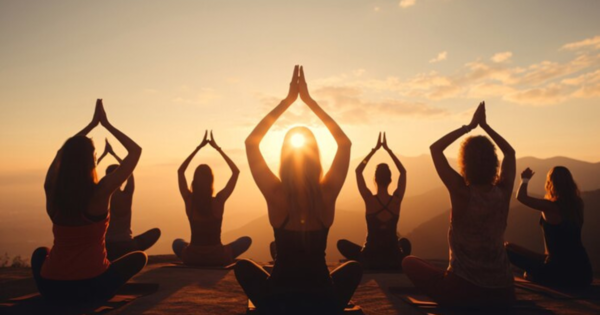What is Rocket Yoga?
“The Rocket,” or Rocket Yoga, is a contemporary outlook of Ashtanga Vinyasa Yoga. It was developed in the 1980s by Larry Schultz, who combined more playful vinyasa sequences with classic Ashtanga positions. Rocket Yoga is more adaptable and faster-paced than Ashtanga. Three sequences make up the practice, each concentrating on a distinct element of strength, flexibility, and balance.
What are the origins of this yoga?
Image: iStock
Larry Schultz, a student of Ashtanga founder Pattabhi Jois is regarded as the one who developed Rocket Yoga after years of practicing and teaching Ashtanga. Schultz wanted to create a yoga style that was more accessible and adaptable, without the strict structure of traditional Ashtanga. During his time as the yoga teacher for the rock band The Grateful Dead, guitarist Bob Weir reportedly named the practice “The Rocket” because it “gets you there faster.” And this yoga quickly became known as Rocket Yoga.
Key features of Rocket yoga

The idea of rocket yoga is to blend an Ashtanga style of intensity with a fluid, lighthearted style. Key components of this yoga technique include the following:
- Faster tempo: Rocket Yoga moves at a quicker rhythm, making the practice feel like a moving meditation.
- Focus on inversions and arm balances: Rocket Yoga encourages practitioners to explore handstands, headstands, and arm balances, which can be modified for all skill levels.
- Accessible for everyone: Whether you’re a beginner or an advanced yogi, Rocket Yoga offers modifications for every pose, ensuring that everyone can participate.
- Add the element of music: Rocket Yoga often uses upbeat music, creating an energetic and motivating atmosphere during practice.
How yoga elevates overall well-being
How rocket yoga boosts health
Rocket Yoga offers numerous physical and mental health benefits. Here’s how regular practice can help you improve your overall well-being:
- Builds strength: The various arm balances and inversions in Rocket Yoga are excellent for building upper body and core strength.
- Improves flexibility: Dynamic stretches and forward folds in the sequences help increase flexibility, particularly in the hamstrings and spine.
- Better cardiovascular health: With its faster tempo, Rocket Yoga helps elevate heart rate and improve cardiovascular fitness.
- Boosts mental focus: Practicing challenging poses and coordinating them with breathwork sharpens concentration and mental clarity.
- Reduces stress: The combination of movement and breathing helps release tension and reduce stress.
- Increases energy: The fast-paced flow and focus on breathwork increase overall energy levels which gives us a feeling of refreshment.
The rocket yoga sequences
Rocket yoga consists of three main sequences:
Rocket 1: This sequence focuses on stretching the hamstrings and forward bends, and it is based on the Ashtanga Primary Series.
Rocket 2: This sequence uses spine twists and backbends to activate the nervous system.
Rocket 3: This workout targets all muscle groups and is suitable for all skill levels.
A well-rounded practice that tests the body and mind is ensured by including sun salutations, standing poses, arm balances, and inversions in each part.


